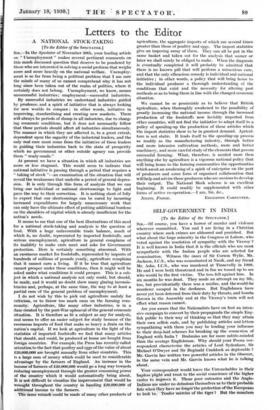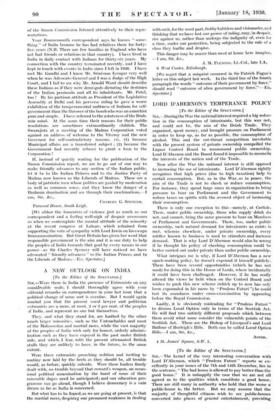SELF-GOVERNMENT IN INDIA
[To the Editor of the SPECTATOR.]
Six,—Of course, you have a horror of murder and violence wherever committed. You and I are living in a Christian country where such crimes are abhorred and punished. But what about the large minority in the Congress at Lahore, who voted against the resolution of sympathy with the Viceroy ? It is well known in India that it is the officials who are most sympathetic with the Indian people who are selected for assassination. Witness the cases of Sir Curzon Wylie, Mr. Jackson, I.C.S., who was assassinated at Nasik, and my friend Mr. Ashe, I.C.S., who was murdered at Tinnevelly in 1909. He and I were both threatened and in fun we tossed up to see who would be the first victim. The toss fell against him. In six months he was dead. They made an attempt on my life, too, but providentially there was a misfire, and the would-be murderer escaped in the darkness. But Englishmen have never yet been deterred from their duty by threats, and bombs thrown in the Assembly and at the Viceroy's train will not effect what reason cannot.
Are you aware that the Nationalists have on foot an inten- sive campaign to convert by their propaganda the simple Eng- lish public to their way of thinking so that they may attain their own selfish ends, and by publishing articles and letters sympathizing with them you may be lending your influence to their deep-laid schemes for breaking up the connexion of England with India ? Brahmins are far more subtle-minded than the average' Englishman. Why should- your Poona cor- respondent characterize the articles of Lord Sydenham, Sir Michael O'Dwyer and Sir Reginald Craddock as deplorable ? Mr. Garvin has-written two powerful articles in the Observer, in the same vein and Mr. Garvin knows what he is talking about.
Your correspondent would leave the Untouchables in their hapless`plight and trust to the social conscience of the higher castes to improve it. Those poor outcastes and the Anglo- Indians are under no delusions themselves as-to their probable fate when they have no longerthe protection of the Europeans to look to. Tender -miries of the tiger l But the members of the Simon Commission listened attentively to their repre- sentations.
Your Bournemouth correspondent says he knows " some- thing " of India because he has had relatives there for forty- five years (N.B. There are few families in England who have not had friends or relations in that country). I have lived in India in daily contact with Indians for thirty-six years. My connection with the country terminated recently, and I have kept in touch with events in India since I left in 1926. I have met Mr. Gandhi and I knew Mr. Srinivasa Iyengar very well when he was Advocate-General and I was a Judge of the High Court, and I fail to see why Mr. Arnold Ward should describe these Indians as if they were demi-gods dictating the destinies of the Indian peninsula and all its inhabitants. Mr. Patel, too ! By his partisan attitude as President of the Legislative Assembly at Delhi and his perverse ruling he gave a worse exhibition of the temperamental unfitness of Indians for self- government than the thrower of the bomb who was an anarchist pure and simple. I have referred to the astuteness of the Brah- min mind. At the same time their reasons for their public resolutions are sometimes extraordinarily childish. The Swarajists at a meeting of the Madras Corporation voted against an address of welcome to the Viceroy and the new Governor for self-contradictory reasons, viz. (1) because Municipal affairs are a transferred subject ; (2) because the Government had recently refused to grant a loan to the Corporation I If, instead of quietly waiting for the publication of the Simon Commission report, we are to go out of our way to make friendly advances to any section of the Indian public, let it be to the Indian Princes and to the Justice Party of Madras now known as the Liberals of Madras. These are a body of patriotic men whose politics are guided by moderation as well as common sense, and they know the danger of a Brahmin domination and see through their machinations.—I am, Sir, &c.,
CHARLES G. SPENCER. Tarwood House, South Leigh.
[We abhor the fomenters of violence just as much as our correspondent and a feeling well-nigh of despair overcomes us when we contemplate the mental attitude of the minority at the recent congress at Lahore, which refrained from supporting the vote of sympathy with Lord Irwin on his escape from assassination. But Great Britain has given her word that responsible government is the aim and it is our duty to help the peoples of India towards that goal by every means in our power—as Sir Charles Spencer will have noticed we have advocated " friendly advances " to the Indian Princes and to the Liberals of Madras.—En. Spectator.]







































 Previous page
Previous page